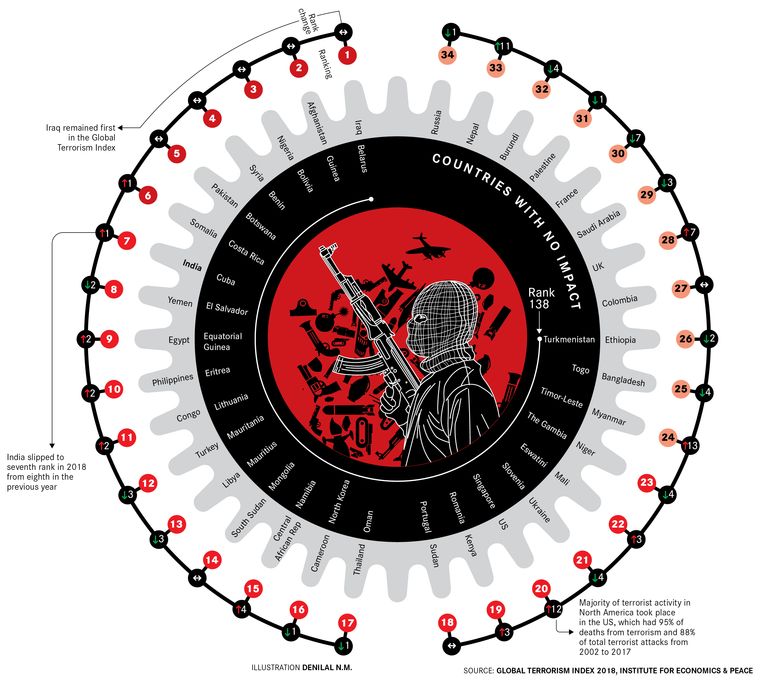On July 26, 2016, two terrorists attacked the church of Saint-Étienne-du-Rouvray in Rouen, France, and beheaded the 86-year-old priest, Jacques Hamel, who was celebrating the morning Mass. The terrorists, 19-year-olds Adel Kermiche and Abdel Malik, had never met the masterminds of the attack. They were radicalised online and got their orders on their mobile phones. The internet has become the most commonly used tool by terrorist organisations. The Global Terrorism Index (2018) compiled by the Sydney-based Institute for Economics and Peace calls it the “new frontier”.
Conventional terrorist incidents, says the index, have fallen for the third consecutive year from their peak in 2014. In Iraq, for instance, deaths have decreased by 60 per cent, although the country still tops the index. It is followed by Afghanistan, Nigeria, Syria and Pakistan, completing the top five countries affected by terrorist violence. India is placed seventh in the list.
The index says the scope of terrorism in India is particularly broad, with 51 different terrorist groups carrying out at least one attack in the period under study. Interestingly, while India has reported a rise in terrorist incidents, there has been a drop in the total number of casualties from the peak of 775 deaths in 2008.
Also read
- Indices: Where India stands in global rankings
- India's demography: All's not well
- Climate change performance index: India rank 11
- Poverty index: India rank 49
- Health care: India needs more doctors
- India needs to spend more to educate its people
- Human rights a messy issue in India
- Liveability index: No Indian city in top 100
Despite the massive defeat it encountered in Iraq and Syria, Islamic State remains the deadliest terrorist group globally, followed by the Taliban, Al Shabaab and the Boko Haram. They killed 10,632 people in 2017, accounting for 56.5 per cent of the total deaths from terrorism. While the Middle East has had some respite from the dangerous cycle of violence, new terrorist hotspots are emerging in Africa and southeast Asia.
The sustained rise of the far right is yet another cause for worry. Right wing populists are now in power in several crucial states such as the United States, Britain, Turkey and Hungary. The index has taken note of this rightward shift, and predicts an increase in violent incidents.
Yet, the biggest threat in the days to come will be in the cyberworld. The next world war could possibly be triggered by acts of cyberterrorism. The capabilities acquired by countries such as China and the damage they could inflict are unbelievable. Last year, the French daily Le Monde broke a story about cyberespionage at the African Union headquarters in Addis Ababa. The $200 million office, which hosts African heads of state every six months, was built by China. In January 2017, a local computer expert found that at midnight, the servers in the office, which were installed by the Chinese telecommunication giant Huawei, would start transmitting huge volumes of data to servers in Shanghai, sharing details of all that happened during the day. It had been going on for five years. With 5G technology likely to dominate global networks in the days to come, crime fighters will need newer tools to stay ahead of cyberterrorists.


